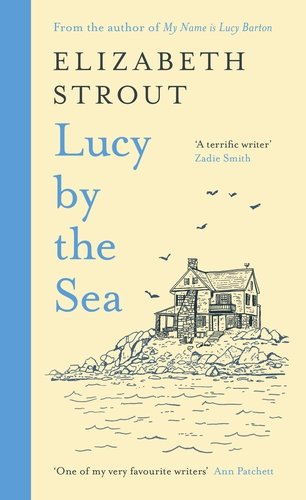It's been several years since Strout first started writing about this particular reflective heroine beginning with “My Name is Lucy Barton” and continuing aspects of her story through the books “Anything is Possible” and “Oh William!” - though I'd say this new novel is the most straightforward sequel yet as events follow directly on from the end of that third novel. Lucy's later life becomes even more entangled with her first husband William as the recent pandemic hits America and they go into lockdown together in a borrowed coastal house in Maine. Lucy recounts her difficulty navigating this intense period of time and describes new discoveries regarding her personal history and events to do with her family life.
By now Lucy has come to feel like an old friend. I have a deep affection towards her but I also find her slightly irritating. She has a particular idiosyncratic way in which she sifts through the past alighting upon significant moments she remembers with great clarity while other aspects of her personal history and life seem mysterious to her. Of course, this is very relatable and it's what gives Strout's stories great humanity. But Lucy's ponderousness and low self-esteem can also be trying. This is certainly deliberate as William and her adult daughters occasionally express their impatience with her. However, as we come to understand the continuing impact her impoverished and difficult familial relationships have had upon her life these aspects of her personality make much more sense.
My experience of this novel was influenced by reading the entire book aloud to my husband while we were on a recent long road trip. It really brought the story to life as we laughed or gasped at certain parts and discussed it in between sections. As always I'm delighted at affectionate jibes Strout makes about life in Maine such as how fiercely cold it gets, but there's also a particular reason why Lucy intensely hates being cold. Strout also doesn't shrink from revealing darker aspects of Maine life such as the insular nature of some of its citizens who are hostile to outsiders. Since Lucy's narrative is quite straightforward and chatty it made reading it aloud particularly pleasurable. I think there's also a deceptive simplicity to Strout's writing which touches upon really profound subject matter from the evolving nature of love to deep political divisions in America while also representing the foibles and peculiar details which make us human.
Barton drops in plenty of “catch up” information throughout this novel in case readers haven't read or have forgotten details from the previous books. So it can certainly be read as a stand-alone book. However, I can't imagine coming to this novel without having read the previous books and my appreciation and understanding of it was certainly enhanced since I've travelled the entirely of this extensive journey with Lucy. A knowledge of Barton's entire oeuvre is also handy as characters from her previous books such as “The Burgess Boys”, “Olive Kitteridge” and “Olive, Again” make appearances in this new novel. Knowing something of these additional characters gives Lucy's interactions with them an added poignancy and also gave me a feeling of being fully immersed in the fictional alternate universe which Barton has created.
Many dramatic things occur in this novel and shocking secrets are revealed. There's an acknowledge irony to this since it's also about a period of time stuck in a house where circular routines are established and nothing of significance seems to occur for many months. It's an ideal time for mulling things over and Lucy also develops some strong connections with a few local individuals. The story builds to quite a moving conclusion where Lucy arrives at certain revelations. At the same time, she knows the future is always unclear and she becomes equally sure that she knows nothing. This really embodies the quiet genius of this character and it's no doubt why Strout has a continuing preoccupation with Lucy's story. One of Lucy's mortal fears is how we never know when we might see someone for the last time. I don't know if this will be the last book to feature Lucy Barton, but I'm certainly glad to have encountered her again and this latest novel has given me an even deeper appreciation for the previous books.















